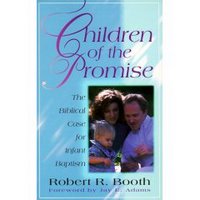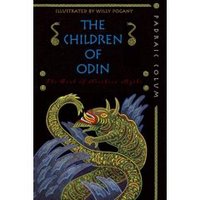I’m reading a number of interesting books at the  moment. One of them is Thomas Woods' The Politically Incorrect Guide to American History. Wow! Does anyone know whether any liberals have tried to offer a scholarly rebutal? I'd be interested in reading any responses from the politically correct gurus.
moment. One of them is Thomas Woods' The Politically Incorrect Guide to American History. Wow! Does anyone know whether any liberals have tried to offer a scholarly rebutal? I'd be interested in reading any responses from the politically correct gurus.
I'm also reading Robert Booth’s Children of the Promise: The Biblical Case for Infant Baptism. Booth makes a strong case as he amasses all the Biblical evidence in support of infant baptism.

 moment. One of them is Thomas Woods' The Politically Incorrect Guide to American History. Wow! Does anyone know whether any liberals have tried to offer a scholarly rebutal? I'd be interested in reading any responses from the politically correct gurus.
moment. One of them is Thomas Woods' The Politically Incorrect Guide to American History. Wow! Does anyone know whether any liberals have tried to offer a scholarly rebutal? I'd be interested in reading any responses from the politically correct gurus.I'm also reading Robert Booth’s Children of the Promise: The Biblical Case for Infant Baptism. Booth makes a strong case as he amasses all the Biblical evidence in support of infant baptism.

Interestingly, I’ve always been a strong paedocommunionist, meaning I don’t believe in withholding communion from the children of believers, however young. I have recently been challenged by another paedocommunionist as well as a baptist anti-paedocommunionist that my paedocommunionism is inconsistent with my baptist views. So I’ve having to look at the issue of infant baptism a bit more seriously.
 As a family, we just finished reading J. R. R. Tolkien’s The Hobbit together. It is always a special book to read, but this time it was extra special because it was the first time Matthew (my seven year old boy) had heard it.
As a family, we just finished reading J. R. R. Tolkien’s The Hobbit together. It is always a special book to read, but this time it was extra special because it was the first time Matthew (my seven year old boy) had heard it.
At the moment I’m reading Matthew The Children of Odin, which is Padraic Colum’s retelling of the Norse myths. We have a number of different retellings of the Norse myths but decided to read this one since the beautiful language really does justice to the subject matter – something that, sadly, cannot be said for most of the fairy tales in the children's sections of our libraries. Jefferson Davis once observed that attacks on great culture always begin with the denigration of language; conversely, I want to suggest, the sustaining and development of great culture begins by exposing our children's minds to beautiful language. This means No Harry Potter. (On the aesthetic and literary deficiency of the Harry Potter books, see John Pennington’s excellent article “From Elfland to Hogwarts, or the Aesthetic Trouble with Harry Potter” in The Lion and the Unicorn 26.1, January 2002.)
We have a number of different retellings of the Norse myths but decided to read this one since the beautiful language really does justice to the subject matter – something that, sadly, cannot be said for most of the fairy tales in the children's sections of our libraries. Jefferson Davis once observed that attacks on great culture always begin with the denigration of language; conversely, I want to suggest, the sustaining and development of great culture begins by exposing our children's minds to beautiful language. This means No Harry Potter. (On the aesthetic and literary deficiency of the Harry Potter books, see John Pennington’s excellent article “From Elfland to Hogwarts, or the Aesthetic Trouble with Harry Potter” in The Lion and the Unicorn 26.1, January 2002.)
I’ve also been downloading audio lectures from various websites. Some of the more interesting lectures include Greg Bahnsen’s three lecture series, ‘A Christian View of War’; Dr. George Grant’s ‘Dumb and Dumber: The Desperate Need for Covenantal and Christian Education’ and Dr. Grant's comparisons between - hold your breath - ‘Lincoln and Lenin’. I’ve also listened to the debate Sproul and Bahnsen had over apologetic method part 1 and part 2. I chose this debate because I hoped it would give me some clarity on the presuppositional/van Tillian approach, which I’ve never been able to get my mind around. However, everything Bahnsen said only confused me further! Because many of the authors and people I respect the most advocate this approach, I am willing to accept (for the moment, at least) that the logical incoherence I find in it may just be the result of my not understanding it properly. I’d welcome the chance to talk to someone more versed in this school of thought.
 As a family, we just finished reading J. R. R. Tolkien’s The Hobbit together. It is always a special book to read, but this time it was extra special because it was the first time Matthew (my seven year old boy) had heard it.
As a family, we just finished reading J. R. R. Tolkien’s The Hobbit together. It is always a special book to read, but this time it was extra special because it was the first time Matthew (my seven year old boy) had heard it.At the moment I’m reading Matthew The Children of Odin, which is Padraic Colum’s retelling of the Norse myths.
 We have a number of different retellings of the Norse myths but decided to read this one since the beautiful language really does justice to the subject matter – something that, sadly, cannot be said for most of the fairy tales in the children's sections of our libraries. Jefferson Davis once observed that attacks on great culture always begin with the denigration of language; conversely, I want to suggest, the sustaining and development of great culture begins by exposing our children's minds to beautiful language. This means No Harry Potter. (On the aesthetic and literary deficiency of the Harry Potter books, see John Pennington’s excellent article “From Elfland to Hogwarts, or the Aesthetic Trouble with Harry Potter” in The Lion and the Unicorn 26.1, January 2002.)
We have a number of different retellings of the Norse myths but decided to read this one since the beautiful language really does justice to the subject matter – something that, sadly, cannot be said for most of the fairy tales in the children's sections of our libraries. Jefferson Davis once observed that attacks on great culture always begin with the denigration of language; conversely, I want to suggest, the sustaining and development of great culture begins by exposing our children's minds to beautiful language. This means No Harry Potter. (On the aesthetic and literary deficiency of the Harry Potter books, see John Pennington’s excellent article “From Elfland to Hogwarts, or the Aesthetic Trouble with Harry Potter” in The Lion and the Unicorn 26.1, January 2002.)I’ve also been downloading audio lectures from various websites. Some of the more interesting lectures include Greg Bahnsen’s three lecture series, ‘A Christian View of War’; Dr. George Grant’s ‘Dumb and Dumber: The Desperate Need for Covenantal and Christian Education’ and Dr. Grant's comparisons between - hold your breath - ‘Lincoln and Lenin’. I’ve also listened to the debate Sproul and Bahnsen had over apologetic method part 1 and part 2. I chose this debate because I hoped it would give me some clarity on the presuppositional/van Tillian approach, which I’ve never been able to get my mind around. However, everything Bahnsen said only confused me further! Because many of the authors and people I respect the most advocate this approach, I am willing to accept (for the moment, at least) that the logical incoherence I find in it may just be the result of my not understanding it properly. I’d welcome the chance to talk to someone more versed in this school of thought.
In Bahnsen's lecture on the ethics of warfare, he argues that since war is as an extension of the police powers of the state, a war may only be waged justly if it falls within the circumscribed area of lawful authority given to the state by God. Because the state has authority only over the people is has responsibility over, it has no right to take authority elsewhere even when the cause is just.
No comments:
Post a Comment